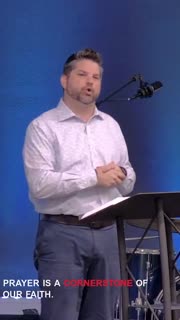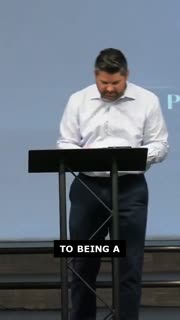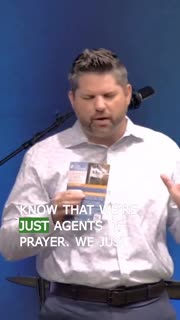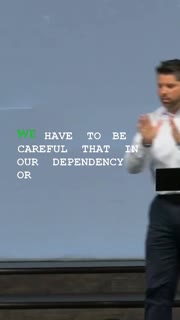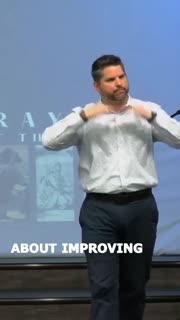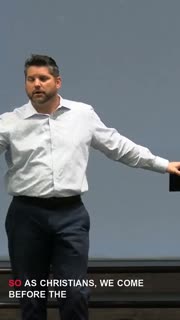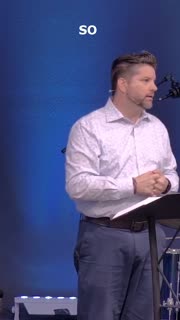Power of Prayer: Trusting God in Crisis
Devotional
Sermon Summary
Bible Study Guide
Sermon Clips
### Quotes for Outreach
1. "We want to love God. We want to love people. And in that pursuit, we want to look more like Jesus. And so, again, thank you for gathering and being here." [13:41] (9 seconds)
2. "Prayer is a cornerstone of our faith. Prayer is such an awesome direct line to the Almighty God that is available to all believers. And in this story, there are three responses that give us key lessons to the topic of prayer." [47:59] (21 seconds)
3. "We serve a God who's in control, and we serve a God who navigates the path. And we need to remember to turn to Him in these moments of crisis. So instead of succumbing to fear, what Hezekiah does is he turns to God in prayer." [56:50] (18 seconds)
4. "Let us commit to being a prayerful people, trusting in God's power and sovereignty to act on our behalf. What stories are you going to tell in the days ahead? Because you prayed." [01:24:25] (15 seconds)
### Quotes for Members
1. "We know that we're just agents of prayer. We just know that we are communicators of the message. We know that we are ambassadors of the truth. But ultimately, we pray for you to draw this young man to yourself." [17:38] (14 seconds)
2. "We have to be careful that in our dependency or trusting in God's sovereignty, we can't allow it to silence our prayers. Because sometimes we just say, it is what it is. I'm not going to pray that the airplane takes off on Thursday morning, connects right in Denver, and then they get to their place on time." [01:05:41] (22 seconds)
3. "Prayer is not about improving ourself or our situation. Prayer is about moving the hand of God and coming before him with adoration and worship. It is a heart that pours out to him." [01:08:20] (15 seconds)
4. "So as Christians, we come before the Lord and we cultivate a habit of gratitude that says, God, I know you are in charge. I know you are sovereign. And though we're going through this crisis, or though we're battling through this heartache, or though I am so confused and fearful and insecure in this moment, I know that you are going to orchestrate this for my betterment, because you are always only good." [01:14:22] (28 seconds)
5. "So don't go at this thinking, pray or no pray, it's going to happen. No. You pray with great seriousness your letter before the Lord and you say, God, I'm trusting you to act on my behalf." [01:07:28] (18 seconds)
Ask a question about this sermon
1. "We want to love God. We want to love people. And in that pursuit, we want to look more like Jesus. And so, again, thank you for gathering and being here." [13:41] (9 seconds)
2. "Prayer is a cornerstone of our faith. Prayer is such an awesome direct line to the Almighty God that is available to all believers. And in this story, there are three responses that give us key lessons to the topic of prayer." [47:59] (21 seconds)
3. "We serve a God who's in control, and we serve a God who navigates the path. And we need to remember to turn to Him in these moments of crisis. So instead of succumbing to fear, what Hezekiah does is he turns to God in prayer." [56:50] (18 seconds)
4. "Let us commit to being a prayerful people, trusting in God's power and sovereignty to act on our behalf. What stories are you going to tell in the days ahead? Because you prayed." [01:24:25] (15 seconds)
### Quotes for Members
1. "We know that we're just agents of prayer. We just know that we are communicators of the message. We know that we are ambassadors of the truth. But ultimately, we pray for you to draw this young man to yourself." [17:38] (14 seconds)
2. "We have to be careful that in our dependency or trusting in God's sovereignty, we can't allow it to silence our prayers. Because sometimes we just say, it is what it is. I'm not going to pray that the airplane takes off on Thursday morning, connects right in Denver, and then they get to their place on time." [01:05:41] (22 seconds)
3. "Prayer is not about improving ourself or our situation. Prayer is about moving the hand of God and coming before him with adoration and worship. It is a heart that pours out to him." [01:08:20] (15 seconds)
4. "So as Christians, we come before the Lord and we cultivate a habit of gratitude that says, God, I know you are in charge. I know you are sovereign. And though we're going through this crisis, or though we're battling through this heartache, or though I am so confused and fearful and insecure in this moment, I know that you are going to orchestrate this for my betterment, because you are always only good." [01:14:22] (28 seconds)
5. "So don't go at this thinking, pray or no pray, it's going to happen. No. You pray with great seriousness your letter before the Lord and you say, God, I'm trusting you to act on my behalf." [01:07:28] (18 seconds)

